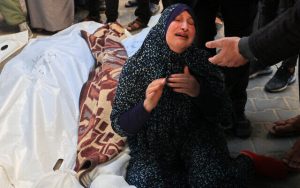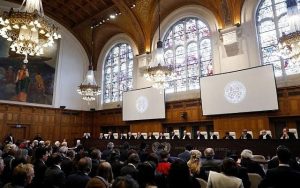
TEL AVIV, Israel (AP) — Israel is sending top legal minds, including a Holocaust survivor, to The Hague this week to counter allegations that it is committing genocide against Palestinians in Gaza.
The robust engagement with the International Court of Justice is unusual for Israel, which normally considers the United Nations and international tribunals as unfair and biased. The decision to participate rather than boycott reflects Israeli concerns that the judges could order Israel to halt its war against Hamas and tarnish its image internationally.
“Israel cannot run away from an accusation that is so serious,” said Alon Liel, a former director general of Israel’s Foreign Ministry and a former Israeli ambassador to South Africa.
Israel, which as one of the parties in the case is entitled to send a judge, has tapped a former Israeli Supreme Court chief justice to join the court’s 15 regular members who will rule on the accusation. It has also enlisted a British barrister and lauded international law expert as part of its defense team.

Israel hopes their expertise will trounce the South African claim that Israel’s military campaign in Gaza amounts to genocide and prevent an interim court order to force Israel to stop the fighting. Israel says halting the war when Hamas’ capabilities are intact in many places and with hostages still in its captivity would amount to a Hamas victory.
The genocide charge strikes at the heart of Israel’s national identity. The country sees itself as a bulwark of security for Jews after 6 million were killed in the Holocaust. International support for Israel’s creation in 1948 was deeply rooted in outrage over Nazi atrocities.
The same year, with Israel’s involvement, world powers drew up the convention against genocide in hopes of preventing similar atrocities.
Israel’s unprecedented air, ground and sea offensive has killed more than 23,200 Palestinians, two-thirds of them women and children, according to health officials in Hamas-run Gaza. Israel’s military campaign has displaced roughly 85% of Gaza’s 2.3 million population, many with no homes to return to. More than a quarter of the population is starving.
South Africa, which has long been a critic of Israel’s treatment of the Palestinians, launched the case at the United Nations’ top court in The Netherlands. Many South Africans compare Israel’s policies toward Palestinians in Gaza and the West Bank with their own country’s former apartheid regime of racial segregation.
Israel vehemently disputes the genocide claims, saying it is fighting a war of self-defense after Hamas militants launched its Oct. 7 attack on southern Israel, killing about 1,200 people, mostly civilians, and taking roughly 250 hostage. Israel says its actions comply with international law and that it does its best to prevent harm to civilians, blaming Hamas for embedding in residential areas.

South Africa’s 84-page filing says Israel’s actions, including killing Palestinians and causing serious mental and bodily harm, “are genocidal in character.” It says Israeli officials have expressed genocidal intent.
The case will likely drag on for years. But South Africa’s filing includes a request for the court to urgently issue legally binding interim orders for Israel to “immediately suspend its military operations in and against Gaza.”
Abiding by such a ruling would be politically costly for Prime Minister Benjamin Netanyahu, with Israelis still largely supportive of the war. Israel would also fall short of its declared goal of crushing the militant group.
If it doesn’t abide, Israel could face U.N. sanctions. Although the U.S., Israel’s closest ally, could veto such a move, doing so would anger many Democrats who have already soured on President Joe Biden over his strong support for Israel in the war. That could be damaging for Biden as he seeks reelection. U.S. Secretary of State Anthony Blinken said Tuesday that the case is “meritless.”
Eylon Levy, an Israeli government spokesman, criticized South Africa, saying it was giving Hamas political and legal cover.
“We are appalled that South Africa has chosen to play advocate for the devil,” he said.
An Israeli official said Israel agreed to cooperate with the court because it is confident it will prevail. The official spoke on condition of anonymity because he was not authorized to discuss the matter with the media. Israel boycotted a prominent case at the court in 2004 about its West Bank separation barrier, which the court ruled was “contrary to international law,” saying the proceedings were politically motivated.
Israel chose Aharon Barak — a mainstay of the country’s legal world for decades — to join the panel of international judges. A former attorney general and peace negotiator who served as chief justice of Israel’s highest court from 1995-2006, Barak has ruled in cases related to Israel’s treatment of the Palestinians.
The internationally renowned 87-year-old has received honorary degrees from multiple universities, including Yale and Oxford.
He is also a Holocaust survivor who was sent to Lithuania’s Kovno Ghetto at age 5, where he has said he repeatedly evaded death. That personal detail could be significant in his discussions with the other judges.
Just a few months ago, Netanyahu and his allies vilified Barak as they pushed forward with their plans to overhaul Israel’s judiciary. Barak, under whom the courts took on a more robust role, was seen as a symbol of an overly interventionist legal system.
Protesters held sit-ins outside his Tel Aviv home and politicians lashed out at the octogenarian in Knesset speeches. But facing the case in The Hague, Netanyahu did a quick about face, surprising even his critics.
“At a time of legal troubles in the international arena, Israel has only one person to rely on,” commentator Yossi Verter wrote in the Haaretz daily. “Even Netanyahu understood that there’s nobody but him. He’s our ‘911’ emergency service.”
British lawyer Malcolm Shaw, who will defend Israel, is the author of what’s seen as the definitive textbook on international law. He has represented numerous states, including Ukraine and the United Arab Emirates, in international litigation, including at the International Court of Justice, according to a biography posted online by Essex Court Chambers, where Shaw is a barrister.
Robbie Sabel, a former legal adviser at the Israeli Foreign Ministry who counts Shaw as a friend, said it remained to be seen whether judges from nations with poor ties to Israel will rule objectively. But he said Israel had positioned itself to meet the charges head on.
“They chose the top people,” he said. “It means Israel is taking it very seriously.”
